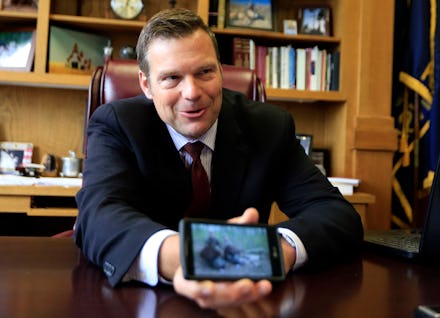Trump voter panel head Kris Kobach “conspicuously absent” from annual secretaries of state meeting

Kris Kobach, the Kansas secretary of state who helps run President Donald Trump’s commission on election integrity, has blamed “fake news” and “obstruction by a handful of state politicians” for a mass refusal to give the panel data on millions of registered voters.
But given the chance to deliver that message to his counterparts in person this weekend at a meeting of the National Association of Secretaries of State, Kobach is apparently taking a pass.
“Talk about conspicuously absent,” California Secretary of State Alex Padilla said in a Friday phone call with Mic from the convention site in Indianapolis.
Kobach is “lodging criticism at those of us not seeking to fulfill his requests for data by saying, ‘What do we have to hide?’” Padilla said. “What did he have to hide by not showing up?”
A spokeswoman for NASS confirmed to Mic that Kobach isn’t attending the group’s summer conference. She said, when asked, the group’s events manager did not recall Kobach having given a reason for not being there.
A Kobach spokeswoman didn’t respond to Mic requests for comment.
Kobach’s Twitter feed was quiet Friday; his last post, on July 6, was a link to a piece he wrote for Breitbart in defense of the commission’s data request.
The Breitbart op-ed concluded, “The bottom line is that without these publicly-available copies of the voter rolls, the commission will be unable to effectively measure the extent of voter fraud in America. Maybe that’s the real objective of the officials who are standing in the way.”
Padilla is co-chairman of the NASS committee that deals with election law; Kobach is listed as a member of that committee.
The Kobach letter, which requested information ranging from voters’ names and addresses to their participation history and military and criminal backgrounds, “is clearly the elephant in the room... There’s certainly a lot of chatter in the lobby and in the hallways,” said Padilla, who was among the earliest state officials to reject the data request.
“Look, coming into the conference, I’m encouraged. Secretaries, both Democrat and Republican, have been speaking out repeatedly over the course of this last week on the the clear overreach that the letter from the advisory commission represented, the data request, specifically,” he said.
“I guess my question — my challenge — to the group is, will there be the backbone to speak up and take a stand collectively?”
Padilla told Mic the issue is even more pressing given the panel’s apparent focus on sussing out voter fraud, perhaps of the systemic kind Trump has alleged occurred in 2016 (without providing proof): “Allegations of massive voter fraud or are nothing but lies,” he said.
And just Friday, he said of Trump, “he met with Vladimir Putin and is accepting his denial of having interfered with last year’s elections? When our intelligence community is completely united in having documented the Russian interference in our elections being directed by Putin? So Trump is taking his word over our intelligence community?”
Padilla charged that the bipartisan election integrity panel, headed by Vice President Mike Pence, exists “number one, to massage the president’s ego, because he can’t accept the fact that he lost the popular vote; number two, to attempt to distract us from the Russian interference in the election; and number three, to justify what will undoubtedly be conclusions and recommendations that will go backwards on voting rights.”
Groups that support the panel, such as the conservative Judicial Watch, say there’s enough evidence of potential fraud to justify an investigation.
In a Friday statement on behalf of Democratic Secretaries of State, a group she chairs, Connecticut Secretary of State and integrity commission critic Denise Merrill also encouraged NASS to take action.
“DASS is hopeful for a bi-partisan response with their Republican counterparts to what has been widely panned as an overreaching and unnecessary request for personal information from the Kobach Commission,” Merrill said.
“We already know we have support from several Republican Secretaries of State based on public statements and hope they will all join us in agreeing that certain actions by this commission are an overreach and will lead to undermining access to voting.”